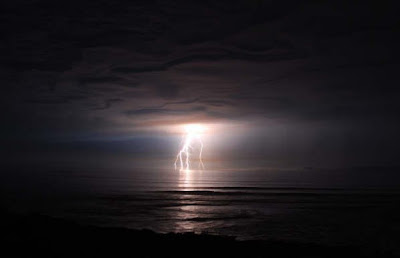I
The man bent over his guitar,
A shearsman of sorts. The day was green.
They said, "You have a blue guitar,
You do not play things as they are."
The man replied, "Things as they are
Are changed upon the blue guitar."
And they said then, "But play, you must,
A tune beyond us, yet ourselves,
A tune upon the blue guitar
Of things exactly as they are."
II
I cannot bring a world quite round,
Although I patch it as I can.
I sing a hero's head, large eye
And bearded bronze, but not a man,
Although I patch him as I can
And reach through him almost to man.
If to serenade almost to man
Is to miss, by that, things as they are,
Say that it is the serenade
Of a man that plays a blue guitar.
III
Ah, but to play man number one,
To drive the dagger in his heart,
To lay his brain upon the board
And pick the acrid colors out,
To nail his thought across the door,
Its wings spread wide to rain and snow,
To strike his living hi and ho,
To tick it, tock it, turn it true,
To bang it from a savage blue,
Jangling the metal of the strings...
IV
So that's life, then: things are they are?
It picks its way on the blue guitar.
A million people on one string?
And all their manner in the thing,
And all their manner, right and wrong,
And all their manner, weak and strong?
And that's life, then: things as they are,
This buzzing of the blue guitar.
V
Do not speak to us of the greatness of poetry,
Of the torches wisping in the underground,
Of the structure of vaults upon a point of light.
There are no shadows in our sun,
Day is desire and night is sleep.
There are no shadows anywhere.
The earth, for us, is flat and bare.
There are no shadows. Poetry
Exceeding music must take the place
Of empty heaven and its hymns,
Ourselves in poetry must take their place,
Even in the chattering of your guitar.
--Wallace Stevens
 Érik Desmazières is a French artist and printmaker, born 1948, whose existence I just discovered last month. I liked what I was able to find of his work online so much that I ordered, as a birthday present to myself, a copy of the catalog of a major exhibition of his work (Imaginary Places, 2007). It is full of wonders.
Érik Desmazières is a French artist and printmaker, born 1948, whose existence I just discovered last month. I liked what I was able to find of his work online so much that I ordered, as a birthday present to myself, a copy of the catalog of a major exhibition of his work (Imaginary Places, 2007). It is full of wonders. Desmazières' most famous work seems to be a series of illustrations he did for Borges' story of the infinite library (above). These represent a major category of his work, precise renderings of imaginary buildings and cities, often with repeating motifs that create hypnotic effects. I like many of these, although some of them look like imitations of Escher.
Desmazières' most famous work seems to be a series of illustrations he did for Borges' story of the infinite library (above). These represent a major category of his work, precise renderings of imaginary buildings and cities, often with repeating motifs that create hypnotic effects. I like many of these, although some of them look like imitations of Escher. I like other categories of his work even better. He has done a series of drawings of Wunderkammer or cabinets of curiosities (top, click to enlarge) that I find marvelous, ghostly pirate ships, fantastic landscapes, demonic masked balls, and many other things. I recommend his work highly.
I like other categories of his work even better. He has done a series of drawings of Wunderkammer or cabinets of curiosities (top, click to enlarge) that I find marvelous, ghostly pirate ships, fantastic landscapes, demonic masked balls, and many other things. I recommend his work highly.





































